by Nancy Jaffer | Jan 7, 2025
Kara Pinato Scro has joined the U.S. Equestrian Team Foundation as assistant executive director, a position in which she reports to Executive Director Bonnie Jenkins.
Kara, who previously worked for Jump Media, will oversee delivery of the foundation’s programs and ensure its goals are met.
The foundation is the philanthropic partner of the U.S. Equestrian Federation, the governing body for horse sports. Headquartered in Gladstone, N.J., the foundation provides funding to support the competition, training, coaching, travel, and educational needs of the United States’ elite and developing international high-performance athletes and horses.
The foundation’s goal is sustaining competitive excellence. Scro will be involved with the fundraising initiative, “Pathway to the Podium,” which has a $55 million goal in efforts to put USEF athletes on the podium at major international competitions.
A lifelong equestrian, Kara has more than 15 years of experience in public relations and integrated marketing, having held positions in leadership at public relations agencies in New York. Bonnie noted Kara’s “proven ability to build meaningful relationships and foster engagement aligns perfectly with our mission, and her passion for supporting high-performance equestrian sport is evident.”
For her part, Kara explained, “My interest in horses and competition was piqued as a young child after attending an event at the USET Foundation’s headquarters. Having the chance to make a tangible impact within the sport I love is a full-circle moment in my career.”
by Nancy Jaffer | Jan 2, 2025
Paul Cronin, director of Sweet Briar College’s riding program from 1967 to 2001, died Dec. 29 after a brief illness. He was 86.
His influential time at Sweet Briar ran from 1967 to 2001, but in addition to being a respected teacher, the Middleburg, Va., resident was an author, rider and mentor. Mr. Cronin dedicated his life to educating young people about the American Forward Riding System, teaching and coaching generations of students who have successfully competed at horse shows and spent time riding to hounds.
At Sweet Briar, he consistently turned out capable and knowledgeable horsewomen on different levels and with a variety of goals. Sports Illustrated cited him twice for coaching a record number of winning intercollegiate teams.
A professor emeritus for Sweet Briar since 2001, he taught clinics throughout the U.S., as well as in Brazil and England. Mr. Cronin specialized in teaching advanced students to train and school horses on a range of levels. He emphasized that preparation and consistent hard work led to success with horses and in life.
He received a degree in history from Stonehill College in Massachusetts and a masters in social work in community planning from the University of Pittsburgh. Mr. Cronin served as a lieutenant in the U.S. navy from 1960 to 1964 and as a reservist following that.
Mr. Cronin was a lifelong student of internationally renowned horseman and educator Vladimir S. Littauer. He broadened his riding education overseas, including a sabbatical leave to ride at the French cavalry school at Saumur. He rode and developed a large number of young horses that went on to be top show hunters such as Wait Awhile, Night Pomp, On Target, Bridegroom and No Apologies. In addition, he did graduate work in sports psychology and motor learning at the University of Virginia.
During his 25 years as an “R” hunter and hunter seat equitation judge, he served on the AHSA (now USEF) committee that established clinics for judges. His many accolades include Educator of the Year from the Virginia Horse Council in 1997, the USHJA Professional Service Award in 2007 and the USEF Pegasus Award in 2009, as well as induction into the Virginia Horse Shows Association Hall of Fame in 2010. His book, “Riding and Schooling the Sport Horse,” was published in 2004 by the University of Virginia Press and reprinted in 2005.
Mr. Cronin also enjoyed a successful career as a clinician and consultant for both institutional and commercial equestrian programs. He rode regularly with the first flight of the Orange County (Va.) Hounds and especially enjoyed helping young professionals and schooling horses in the Forward Riding System.
He always thought of ways to make things better for horses and riders. Mr. Cronin focused on the relationship between the horse and rider in a way that respected the horse.
Mr. Cronin was predeceased by his wife, Elizabeth Ann Swift Cronin. He is survived by sons Peter Fleming Cronin (Cynthia Thiele) of Phoenix, Ariz., and David Richmond Cronin (Catherine) of Charlotte, N.C. as well as three granddaughters.
In accordance with his wishes, a private graveside service for family will be held at a later date.
Those wishing to make memorial contributions may consider the Piedmont Environmental Council, PO Box 460, Warrenton, VA 20188 or The Friends of Riding, Sweet Briar College, PO Box 6, Sweet Briar, VA 24595.
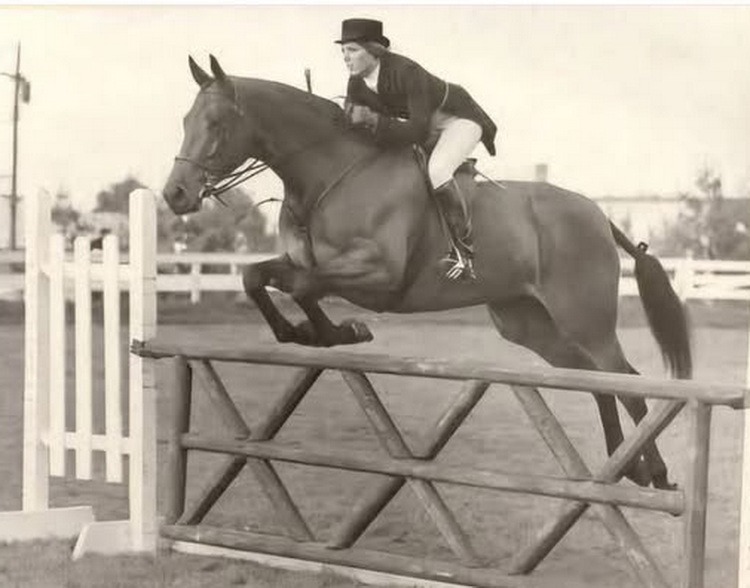
by Nancy Jaffer | Jan 1, 2025
A top rider of hunters and jumpers, Terry Rudd died Tuesday at age 75.
Miss Rudd, who competed on the U.S. Equestrian Team, was tenth in the Alternate Olympics when the U.S. boycotted the Moscow Games. She piloted many well-known jumpers, including Rise ‘N’ Rule, Fat City, Semi-Tough; Mr. Demeanor, winner of the American Invitational and P.S. Gazpacho, victorious in the American Gold Cup.
A member of the National Show Hunter Hall of Fame, she had a well-earned reputation as a stylist who was equally at home on hunters such as Spindletop Showdown, showing them off to good advantage.

Terry Rudd showing in the hunter division.
A native of Pennsylvania, she gained fame on the 1961 American Horse Shows Association pony team that won an international competition in England. She was riding Hot Shot Kid, who took the large pony title at the 1961 and 1962 editions of the National Horse Show.
Miss Rudd rode for Junie Kulp’s All Around Farm of Gwynned Valley, Pa., where her mounts included Not Always and Brenton Reef. She also had a stint with rider and trainer Paul Schockemohle in Germany.
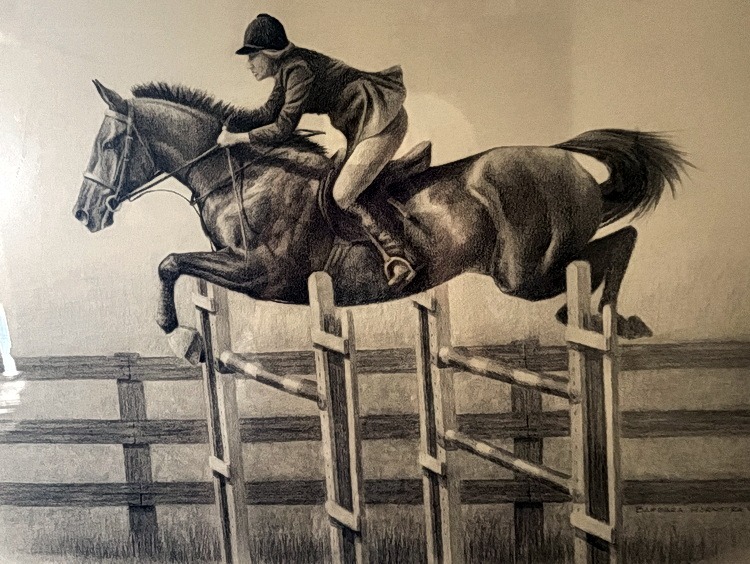
by Nancy Jaffer | Dec 26, 2024
It’s the season for reminiscing, a time to recall the year gone by, which I will do on this website before 2024 ends.
But at the moment, I am reaching further back with my nostalgia; a half-century, in fact, remembering a horse and rider who made their mark in a very different time.
We always celebrate the competitors at the very top of the game, Olympians or professionals who make a living in horse sport. But this story is about an amateur who achieved recognition with her equine partner of a lifetime. It happened before warmbloods dominated the jumper ranks, when what were often considered big money prizes added up to five figures (or even less), and the heyday of horses selling for hundreds of thousands of dollars (or more) was still to come.
A field hunter who had a habit of overjumping his fences went to a horse dealer for dispersal. The gelding, an appendix-registered Quarter Horse without papers, eventually wound up with New Jersey rider Diane Ward. The horse was Traveler, who became a dominant force in the Northeast’s amateur-owner jumper ranks during the 1970s. Anyone who witnessed this pairing will never forget the determined way they conquered the fences; they always drew a crowd.
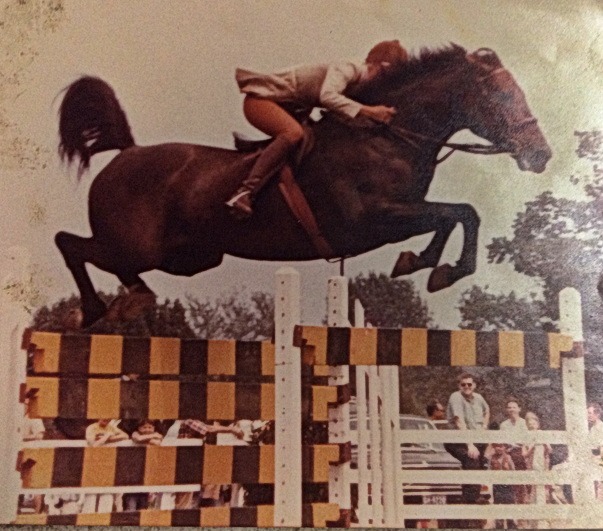
Diane Ward and Traveler airborne in their typical exuberant style.
Traveler took the A-O division’s American Horse Shows Association Horse of the Year title in 1974; yes, 50 years ago, which is why we’re commemorating this anniversary in 2024. Then he did it again in 1976. (AHSA was one of the predecessors of the current U.S. Equestrian Federation).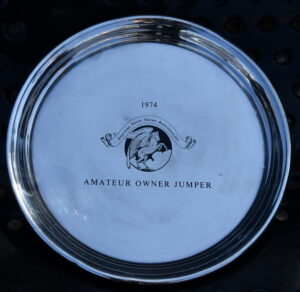
The memorable partnership began this way: Diane’s friend, Jo Iacono, bought Traveler from the dealer in 1969 (or so) after Diane tried him out for her and then showed him. But the dynamic horse didn’t turn out to be Jo’s type of ride.
“He wasn’t broken well on the flat,” recalled Diane, who noted, “riding on the flat, at least with the jumpers, is 50 percent of your ballgame. You don’t just get on and go to a fence.” But when it came time to ride a course, Traveler could jump with enthusiasm and accuracy, getting sharper with more training..
Diane was in the saddle when he demonstrated his prowess by winning in Preliminary jumpers (a division based on prize money won that doesn’t exist anymore) at the old Middlesex County show in New Brunswick, N.J., one of the state’s biggest fixtures at the time.
“This is a horse I want,” decided Diane, who had a limited budget. She didn’t let that stop her, however.
“We negotiated, sitting around all day. How much was I going to pay for him?” remembered Diane, who had ridden the horse all year and spent the winter doing dressage work with him.
The price was $5,000, an unreachable figure for the prospective buyer. Diane finally talked her way into paying $2,800, which was her limit, to get the horse. He turned out to be a bargain.
As a child, Diane began taking saddle-seat lessons in West Virginia. When her family moved to Smoke Rise in Kinnelon, N.J., she informed her parents that she wasn’t going unless they bought her a horse. That’s how the Morgan mare, Caramel, came into her life.
She remembers showing Caramel in saddle-seat classes at the old Junior Essex Troop Show in West Orange, N.J., during the mid-1950s. Trainer Vic Goines, who coached riders at Oakland Academy, felt Caramel would fit in well with the school’s program. So that’s where she and Diane went.
Patricia Byrne, who would later become one of Diane and Traveler’s chief rivals with another quarter horse, East Side Drive, remembered Diane from her own early days working with Vic.
“I knew nothing, was totally in awe when watching Diane ride,” recounted Patricia, now a horse show official.
Diane moved on to work with trainer Ben Purifoy at Smoke Rise in Kinnelon, N.J. In 1971, after buying Traveler, she started the year as amateur-owner jumper champion at the Saratoga, N.Y. show. Traveler competed against such well-known pairings as Michele McEvoy (now Grubb) with Advance Ticket and Melanie Smith (now Taylor) who rode The Irishman in amateur classes and was the division’s national champion in 1970. (She eventually rose from the amateur ranks to compete internationally and won team gold at the 1984 Olympics with Calypso.)
Melanie remembers that the combination of Diane and Traveler was one “to always watch, and hope you went after them in the jump-off” in order to beat the sizzling clockings they set.
Pat Campbell, who also competed around that time, recalled Traveler as “just an incredible horse, fun to watch.”
Patricia, who would take the national amateur-owner title in 1977 with East Side, commented about Diane, “She was always the one to try and beat. Traveler was lightning fast, turned on a dime and Diane was a fierce competitor.”
In 1972, things were off to a promising start for Diane and Traveler. They went to the old Winter Haven show in Florida, got the championship again at Saratoga, and did well at Ox Ridge and Fairfield. Then Traveler competed at a small show in New Jersey as a tune-up and stepped on a rock.
“That was it for the year,” noted Diane, noting the veterinarians were stumped trying to find out what was wrong with the horse.
Meanwhile, Pete Bausum, a nephew of one of her friends, had recently graduated from the University of Pennsylvania veterinary school and examined Traveler. He X-rayed Traveler and found a crack in his coffin bone. That started Diane’s friendship with Pete, who became a top practitioner.
The choice of treatment was “complete stall rest or nerve him.” In response, Diane said, “I’m not nerving him,” so stall rest it was.
During the horse’s recovery, farrier Ralph Snyder built Traveler a special cast-type support shoe. The horse was out of action for close to a year, recuperating while on stall rest, a difficult situation for an animal that previously had been worked every day.
Traveler came back in May 1973, after nearly a year off, and finished fourth in the national standings. He was just warming up.
“In 1974, he was unbelievable, he kept winning,” said Diane, of Traveler’s first national championship year. He was profiled in the yearbook, “Champion Horses and Riders of North America,” a volume put together by former U.S. Equestrian Team Executive Director Jack Fritz.
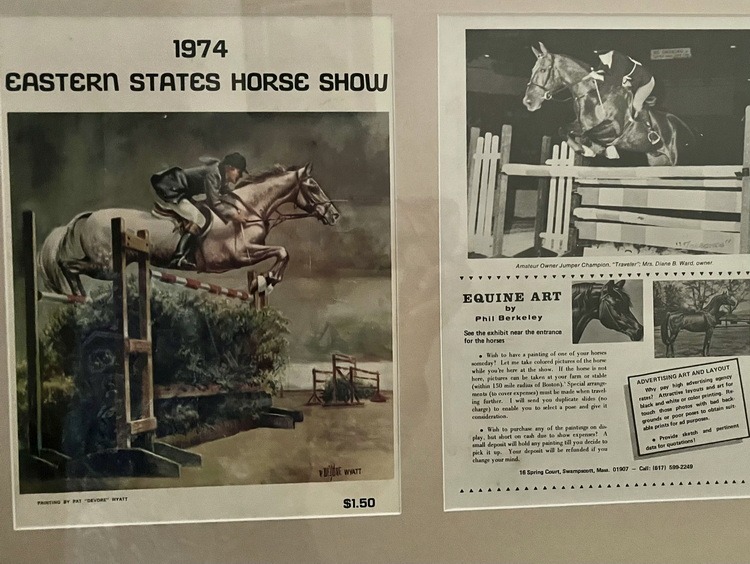
The program from the 1974 Eastern States Horse Show, where a photo of Traveler was featured (upper right).
Among the titles that Traveler won was the A-O championship at the North Shore Horse Show on Long Island. That has special significance to Diane because actor Paul Newman presented the trophy.
After a relatively quiet 1975, Traveler earned the national championship again in 1976. Diane had a lot of offers from people who wanted to buy Traveler. Some bids were around $30,000, “which in those days was pretty good money,” the horse’s owner pointed out, but she had no intention of selling her amazing partner.
Traveler earned enough money in the amateur ranks to qualify for the glamorous open jumper division in 1971 at the National Horse Show, which was one of the highest-profile events at the old Madison Square Garden, between forty ninth and fiftieth streets in Manhattan. (The current Garden opened above Penn Station in 1968).
“I sent the entry form in as a lark,” said Diane. After learning she had been accepted, she thought, “I hoped I wasn’t in over my head.”
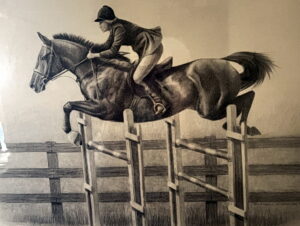
The portrait of Traveler and Diane that hangs in her livingroom.
She cleared the National’s storied puissance wall at 6-feet, 6 inches, but was understandably nervous about trying anything that was bigger (puissance competitions often went to 7 feet or more).
In the next round, “I was so glad he brought the back rail of the spread fence down (a required obstacle in the class) because I didn’t want to jump any higher,” she said.
Traveler got third-place and fifth-place ribbons at the show, competing against the legendary Idle Dice with Rodney Jenkins and The Cardinal, another star of that era, ridden by Bernie Traurig.
After taking the AHSA A-O championship in 1976, Diane turned professional and retired Traveler from high-level competition. Her daughter rode “Trav,” as Diane called him, in the junior jumpers, and eventually Diane started using him for flat lessons. But she had to be careful:
“You couldn’t let him see a jump. He’d just point at it and go. He taught so many kids over the years to walk, trot and canter until he was in his 30s. Even a 5-year old could ride him.”
Diane’s Jack Russell also used to get on his back. Traveler was used in a lesson the day before he died at age 33 in 1993.
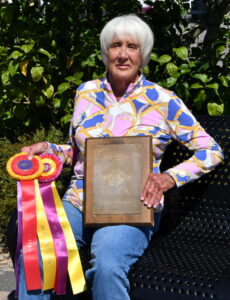
Diane Ward with her AHSA championship ribbons and plaque.
Diane moved to Ocala, Fla., from New Jersey, after her husband, Don, passed away in 2012.
“I fell in love with the place, with the trees. It’s a gorgeous area,” said Diane who lives 10 minutes from the World Equestrian Center and can go there to watch her fill of the jumpers.
With her own showing days long over, she keeps busy volunteering at VOCAL for Pets, (Voices of Change Animal League) a welfare group that offers everything from low-cost spaying and neutering to foster care and vaccinations. Diane is involved with their fundraising Fur Ball and a pet food program that has her unloading pallets of feed every Sunday.
Though Traveler has been gone since 1993, he is still a presence for Diane. A drawing of him hangs in her living room, where she sees it every day. The gelding was more than a brilliant competitor, he had a special personality to go with his athletic ability.
“He was not really a horse,” Diane contends.
“He was like a dog, he would follow you anywhere. He was so good to so many people.”
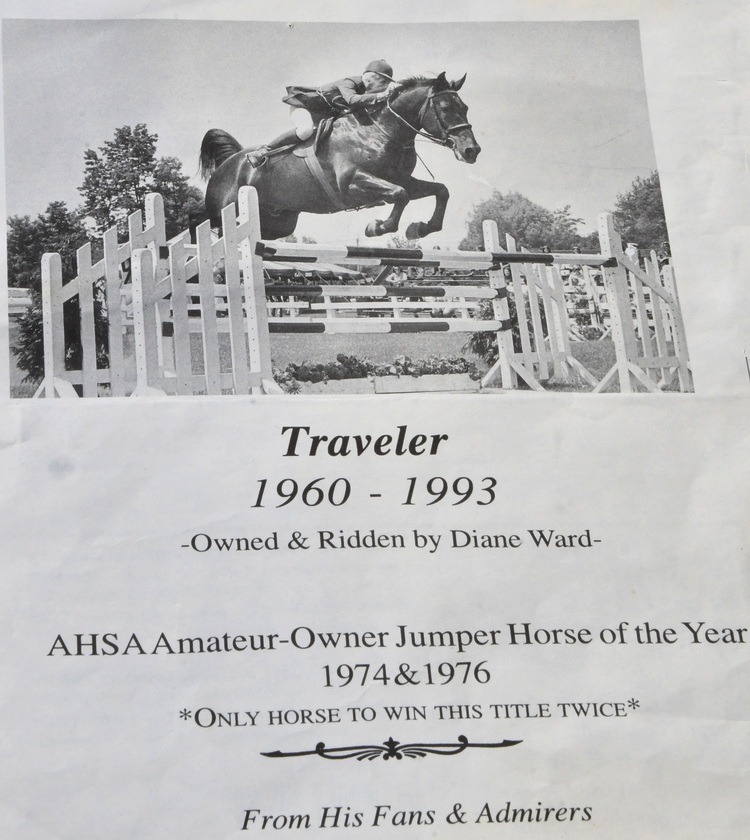
A memorial ad for Traveler.
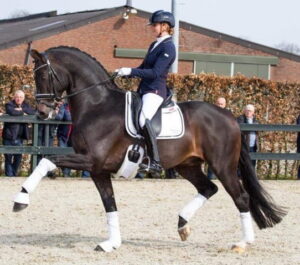
by Nancy Jaffer | Dec 23, 2024
Zen Elite Equestrian has done it again.
The stable that bought Helix, Adrienne Lyle’s U.S. team Paris Olympic mount, and Bohemian, who was reserve for the Paris Games with Endel Ots, has purchased Indian Rock for Adrienne’s 22-year-old student, Christian Simonson.
Ridden in Paris by the Netherlands’ Emilie Scholtens, the 11-year-old KWPN stallion by Apache (hence the inspiration for his name) finished eleventh in the Olympic freestyle with a score of 81.750. Emilie has competed the horse throughout his career.
Christian, tenth on the FEI’s U25 ratings, recalled his first ride on Rocky, who has not yet arrived in the U.S..
The rider’s initial impression was “Wow,” followed by “holy cow. He gave me this unbelievable feeling, like nothing I’ve ever felt.”
Christian explained, “From the very first moment that I rode him, I realized he has so much heart and power that I was a little speechless.”
While he found the horse “expressive,” he noted that even with his innate power, “he’s so harmonious and so beautiful. It gives you a goosebumps feeling, and he’s just so honest, he feels like he wants to try for you as a rider.”

Emilie Scholtens and Indian Rock. (Timo Martis Fotografie)
Christian had watched Rocky since he was a young horse, because he’s a fan of Emilie.
“She’s an incredibly kind person and more important, is a really amazing horsewoman. I thank her for all her kindness.”
Although the horse will be stabled in Wellington after he arrives in the U.S., Christian explained that Adrienne will weigh in on when he should start to show Rocky at Global as their relationship develops.
“I can’t wait to learn more about him as a horse,” said Christian.
“I’m over the moon and so, so excited and grateful,” he continued, effusively thanking Zen Elite’s Heidi Humphries for the opportunity.
“It’s one thing to be able to ride such a once-in-a lifetime horse and also to do it at my young age. It just feels extra special. I also have to thank Adrienne. I feel like the luckiest person to have this opportunity, and I feel even more lucky to be her student and be under her guidance.”
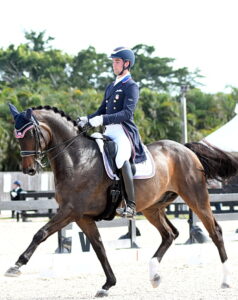
Christian Simonson and one of his own horses, Son of Lady. (Photo © 2024 by Nancy Jaffer)
A statement from Zen, based in Ft. Lauderdale, said, “We’re eager to see this promising partnership thrive and accomplish amazing thing.” Micha Knol of MRK Dressage arranged the sale of the stallion.
Zen does more than buy horses. It also is emerging as a big time sponsor. In addition to its group of dressage riders, Zen sponsors one jumper rider, Jill Briggs, and has been a sponsor of the Annual Series of Equestrian Sport Productions’ spring, summer, fall and holiday jumper shows for the last few years.
However, this year Zen is branching out even more and will be an official Winter Equestrian Festival title sponsor, backing the 1.30 meter jumper division.
“At Zen, the mission is to support equestrian sport at all levels, and they felt that this class was the perfect way to connect with both sides of the sport,” observed Zen’s spokeswoman, Kimberlyn Beaudoin.
by Nancy Jaffer | Dec 21, 2024
Screwworm has expanded from South America into Mexico. The U.S. Equestrian Federation warns that if not controlled, the screwworm flies will continue to move into the U.S. Should that happen, it could have an impact on shows, and movement of horses may be halted.
Screwworm is a type of fly larva (also known as maggots) foreign to the U.S. They can infect any warm-blooded animal, including humans, as they enter wounds as well as mucus membranes to feed on living tissue. Infested animals may have enlarging, draining, foul-smelling wounds and weight loss. They can die from secondary infection or toxicity in seven to 14 days if not treated.
An adult screwworm fly can travel up to 125 miles before laying hundreds of eggs in a wound or on a mucus membrane. The larvae that emerge from the eggs feed on living tissue and then fall to the ground to pupate.Ultimately, adult flies that reproduce will emerge. The adult female screwworm only mates once and lays those eggs to continue the spread of the parasite. Screwworms can also be transported by animals and people with infected wounds traveling from infested areas.
As it is a foreign animal disease, a state and/or federal animal health official must be notified of suspected cases. If screwworm is diagnosed, animal health officials will quarantine the animal until daily wound care and treatments with larvicides and insecticides have eliminated the screwworm larvae. Animal health officials will further investigate cases to determine if additional control measures, such as insecticidal treatment of the environment or sterile fly release, are warranted.
In endemic countries such as those in South America, control is based on a sterile male fly release program. As the female only mates once in a lifetime, the mating with a sterile male fly will reduce the fly population over time. Additionally, movement restrictions and treatment requirements are implemented to further prevent the spread.
Daily inspection of all wounds for any signs of larvae is critical. If larvae (maggots) are detected in a wound, the horse owner should contact their veterinarian immediately so they can perform an assessment of the type of larvae. If screwworm is suspected, samples will be collected for confirmation.
Any livestock or horses entering the United States from a screwworm-affected country are required to be pre-treated with an ivermectin product, remain in an import quarantine facility for a seven-day observation period, and complete a screwworm examination.Sedation is required for the examination of the sheath of stallions and geldings. If examination reveals no screwworms, the horse will be released.
For more information and images of screwworm, click on this link.













